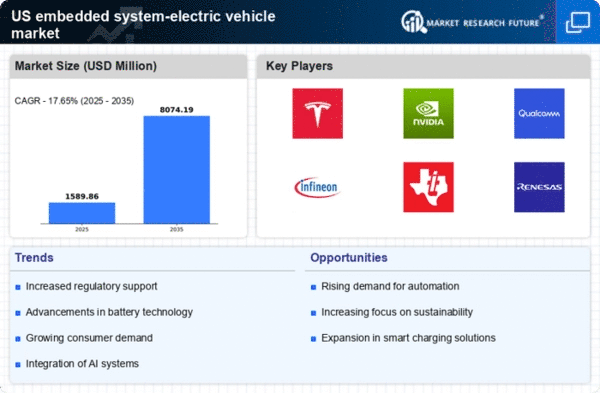Integration of Smart Technologies
The integration of smart technologies into electric vehicles is reshaping the embedded system-electric-vehicle market. Features such as artificial intelligence, machine learning, and IoT connectivity are becoming standard in modern EVs, enhancing user experience and vehicle performance. For instance, smart navigation systems that utilize real-time traffic data can optimize routes, thereby improving energy efficiency. The market for smart embedded systems is expected to expand significantly, as consumers increasingly seek vehicles that offer advanced connectivity and automation features. This trend not only drives innovation in embedded systems but also creates new opportunities for manufacturers to differentiate their products in a competitive landscape.
Rising Demand for Electric Vehicles
the embedded system-electric-vehicle market is experiencing a surge in demand for electric vehicles (EVs) across the United States. This trend is driven by increasing consumer awareness regarding environmental sustainability and the need to reduce carbon emissions. According to recent data, EV sales in the US have grown by approximately 30% in the last year alone, indicating a robust shift towards electric mobility. As more consumers opt for EVs, the embedded systems that support these vehicles, such as battery management systems and power electronics, become increasingly critical. This rising demand not only enhances the market for embedded systems but also encourages innovation in technology, leading to more efficient and reliable electric vehicles.
Government Incentives and Regulations
Government policies and incentives play a pivotal role in shaping the embedded system-electric-vehicle market. The US government has implemented various tax credits and rebates for EV purchases, which have significantly boosted consumer interest. For instance, the federal tax credit can reach up to $7,500 for eligible electric vehicles, making them more financially attractive. Additionally, regulations aimed at reducing greenhouse gas emissions are compelling manufacturers to invest in advanced embedded systems that enhance vehicle efficiency. These regulatory frameworks are likely to continue evolving, further driving the demand for sophisticated embedded systems in electric vehicles, as manufacturers strive to comply with stringent environmental standards.
Growing Focus on Sustainability and Environmental Impact
The growing focus on sustainability and environmental impact is a key driver of the embedded system-electric-vehicle market. Consumers are becoming more conscious of their carbon footprint, leading to a heightened interest in electric vehicles as a cleaner alternative to traditional combustion engines. This shift is prompting manufacturers to invest in embedded systems that enhance the sustainability of their vehicles. For example, systems that optimize energy consumption and reduce waste are becoming increasingly important. As the demand for environmentally friendly transportation solutions continues to rise, the embedded system-electric-vehicle market is likely to see sustained growth, driven by innovations aimed at improving the ecological footprint of electric vehicles.
Technological Advancements in Battery Management Systems
Technological advancements in battery management systems (BMS) are significantly influencing the embedded system-electric-vehicle market. As battery technology evolves, the need for sophisticated embedded systems that can monitor and manage battery performance becomes increasingly essential. Innovations such as real-time data analytics and predictive maintenance capabilities are enhancing the efficiency and longevity of EV batteries. The market for BMS is projected to grow at a CAGR of around 20% over the next five years, reflecting the critical role these systems play in the overall performance of electric vehicles. This growth indicates a strong demand for embedded systems that can support these advanced battery technologies.
















